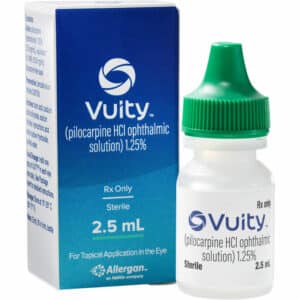“Wait, what? I don’t have to wear reading glasses?”
You may have already heard this line from some TV commercials that have been airing recently. Eyeglass-wearing actors stopping in their tracks when they hear about a new eye drop that can help them see up close without reading glasses. The eye drop is Vuity and it is the biggest medication launch in eyecare in some time. But can it really allow you to ditch your readers?
So what is Vuity, anyway?
Vuity is the first ever medication approved to treat presbyopia. Presbyopia is an age-related condition that decreases the eye’s natural focusing range. It is the cause for many people reaching for reading glasses or bifocals at some point in their 40’s. If you’ve ever gotten out your readers to see small print or held your phone way out at arm’s length to try to bring it into focus, you can thank presbyopia.
Does it really work?
Since I’m in my 40’s and needing reading glasses for up-close work, I’m Vuity’s target audience. And of course, I’ve given it a whirl. And the verdict is … Vuity is no miracle drug that will take your eyes back to their 20’s, but it works pretty well.
Vuity is labelled to be used once per day. In clinical trials, patients gained a significant improvement in their near vision, typically three lines on a near vision chart. In my experience, I was able to achieve glasses-free near vision for around 4-5 hours, but not an entire day. Experiences can vary, and some will likely achieve longer relief. But if your experience is like mine, timing your Vuity dose before your peak times for near vision might be the best strategy. Heading out to the restaurant and don’t want to have to depend on readers to see the menu? Got an afternoon where you’ll be doing a lot of reading? Vuity has you covered. Twice daily dosing is currently being studied as well.
Are there any side effects?
I found the side effects to be consistent with what is stated in the packaging materials. Redness and mild headache were the most commonly reported. Although I didn’t get a headache, my eyes were fairly red for around 15 minutes. Headache sufferers might want to try a test dose before any big occasions or important meetings to see how it affects them.
Another side effect that I also noticed is related to the mechanism of action for Vuity. The active ingredient in Vuity is pilocarpine. Pilocarpine is a drug that has been used in eye care for decades to treat glaucoma. Pilocarpine is a potent pupil constrictor, and the decreased pupil size allows less light to enter the eye. The result is that your environment can seem dimmer than usual. For me, this phenomenon was noticeable, and took a little getting used to. However, it wasn’t overly bothersome. Our pupils naturally enlarge in low-light or nighttime settings to allow more light to enter the eye. Therefore, some caution should be taken if Vuity is used while driving at night. Again, personal experiences can vary, so a test run is always a great idea.
So where can I get it?
Vuity is available only with a prescription. Patients with certain eye diseases should not use Vuity. Also, for some patients it isn’t really the best option to help their vison. The only way to know for sure is with a visit to your eye doctor. Contact Coleman Eye Center today to see if Vuity is right for you!
Lee Coleman, MD
Dr. Lee Coleman is an ophthalmologist with Coleman Eye Center in Greenwood, MS. He is committed to improving the vision and protecting the eyes of his patients by building compassionate care relationships and utilizing advanced technology. Dr. Coleman is board certified through the American Board of Ophthalmology. He and his wife, Amy have six children and one grandson.



